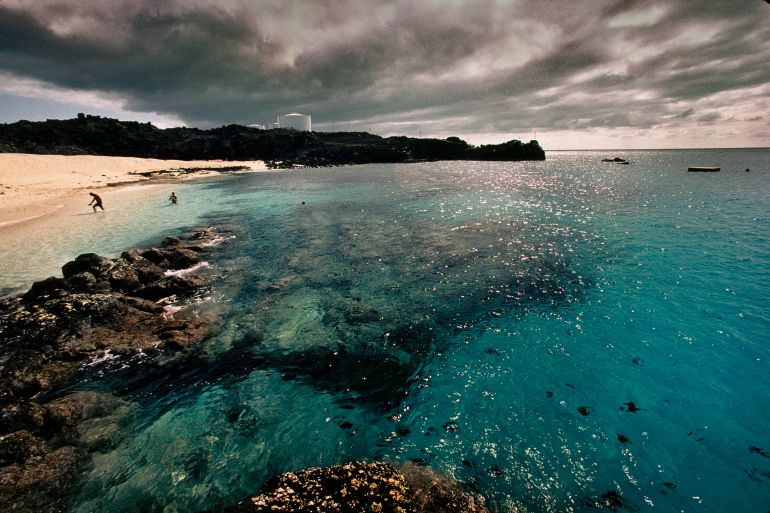‘Alarming’: Experts slam UK plan for offshore asylum centre
Plans to hold asylum seekers on Ascension Island, along with other proposals, draw ridicule and human rights concerns.

London, United Kingdom – Ascension Island is an isolated volcanic island that sits in the South Atlantic Ocean, around 2,300km from the coast of Brazil.
Along with Saint Helena and Tristan da Cunha, it is a British Overseas Territory, although more than 6,000km away from the United Kingdom.
Keep reading
list of 4 itemsUN report charts lethal cost of migration over past decade
Conflict, climate, corruption drive Southeast Asia people trafficking: UN
Bodies of three Rohingya found as Indonesia ends rescue for capsized boat
This remote outpost has rarely made the headlines in the UK – until last week, when it emerged that Priti Patel, Britain’s home secretary, has asked officials to explore the construction of an immigration centre on the island.
Patel is well known for her hard-line views on immigration.
In her speech to the Conservative Party conference on Sunday, she pledged to fix the “fundamentally broken” asylum system in the UK. Failing to mention the fact that her party has been in charge of the system for the last 10 years, she promised that next year would see “the biggest overhaul” of the system in decades.
While it remains to be seen what these promised legislative reforms will actually look like, a series of leaks from the home office showed that officials have been examining different options for “offshoring” asylum seekers – a move that appears to be inspired by the Australian government’s controversial use of the island of Nauru to house asylum seekers.
The options mooted by the UK include another South Atlantic island, Saint Helena, as well as Moldova, Morocco and Papua New Guinea.
“The idea of offshore asylum centres was floated but abandoned by the Blair government 15 years ago, and with good reason,” said Colin Yeo, a barrister and author who specialises in asylum law. “It is very likely illegal to remove people from British soil in order to process their claims abroad and would very likely lead to the sorts of horrendous human rights abuses we’ve seen with the Australian system.”
Although recent cases of refugees and migrants crossing the English Channel in boats have increased almost fivefold this year – a shift that has attracted enormous media attention – statistics show that the number of claims overall has actually fallen.
According to Refugee Action, 35,566 asylum applications were made in the UK in 2019 – down from a peak of 84,000 in 2002.
“Around three-quarters of asylum seekers actually get asylum in the UK now,” said Yeo. “It is hard to see why these sorts of extreme, inhumane and very expensive plans are being discussed now.”
Other outlandish ideas from the home office were also leaked – from installing wave machines in the English Channel to disrupt and deter small boat crossings, as well as housing asylum seekers on retired ferries off the British coast.
“That’s clearly bonkers, and I would imagine such proposals have already been rejected,” said Bella Sankey, director of Detention Action.
“But clearly, the fact that the government is even thinking along these lines is deeply alarming. And the question is, what are they going to be able to bring forward and how bad is that going to be?”
Following the leaks, a spokesperson for UK Prime Minister Boris Johnson confirmed that the government was, indeed, examining options for processing asylum claims offshore in a third country: “We are developing plans to reform our illegal migration and asylum policies so we can keep providing protection to those who need it, while preventing abuse of the system and criminality.”
Close to home, there are already examples of the offshore processing of asylum claims. Turkey and Libya, for instance, currently fulfil this function for the European Union.
There are serious problems with this approach, particularly in Libya, where horrific human rights abuses have been documented in refugee detention centres. There are also obvious practical and ethical issues involved in transferring people who have already reached the UK thousands of miles away.
“The very practical question is: why would you do that, if instead you could decide their asylum claim and send them back to their own country,” said Simon Cox, an immigration barrister. “What is the problem that we’re trying to solve? The basic answer is that the government is saying that the ‘hostile environment’ isn’t hostile enough. This isn’t about processing. It’s about deterring people from coming.”
Lawyers and campaigners note that the proposals conform to the government’s hard line on immigration.
“We already have UK-based detention centres, and we’ve already got all of the problems that you see globally in immigration detention centres,” says Sankey. “We speak to victims of trafficking, slavery, and horrific physical abuse every day, and these people are being held in detention.”
Over the last few years, the number of people being held in detention centres in the UK has actually fallen. But the new government, elected in December 2019, has changed direction, with Patel in particular being seen as an ideologue and a hard-liner.
“The Conservative Party still feels electorally vulnerable to the UKIP [Unietd Kingdom Independence Party] element, and so the strategy, electorally, is to play to the authoritarian hard right on immigration and asylum in particular,” said Sankey. “I think that’s where you can trace all of this to, despite the fact that it’s actually at odds with the general movement of policy over the last five years.”
In her speech on Sunday, Patel lumped together “the traffickers, the do-gooders, the lefty lawyers, [and] the Labour Party” saying that they were all “defending the indefensible” on immigration.
“It’s an article of faith that if you’re nasty, fewer people will come,” said Cox. “But people who are desperate might still make that journey, because fundamentally if they’re fleeing war or persecution, they don’t care whether you’re nice to them.”